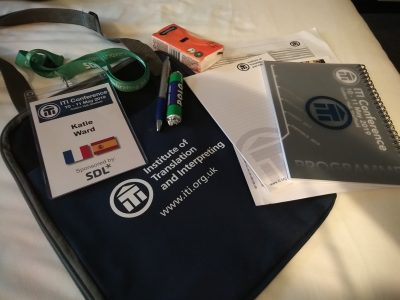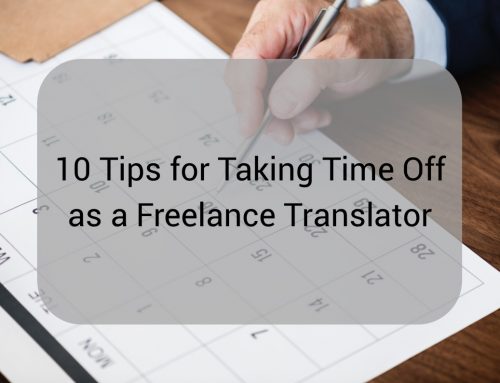Last weekend, I went to my very first translation conference- the ITI Conference in Sheffield. I had an amazing time catching up with old friends and colleagues, meeting new people and learning a lot. Throughout the conference, there were a number of topics and ideas that kept cropping up, so I just wanted to briefly share with you the five main points that I took away from the conference.

1. Machine translation will not be taking over our jobs any time soon.
While it’s obvious that the quality of machine translation has improved greatly, especially in recent years, its capabilities are generally overhyped, and essentially, machine translation cannot even be done without the input of translators. That being said, if you translate like a robot, you’ll be competing with machine translation. Always ask yourself whether you’re adding value and providing a service that a machine cannot.
2. We are all different, and we should use our differences to our advantage.
Do regular SWOT analyses, find out what you’re good at and what you enjoy and use that to your advantage. The way one translator does things won’t necessarily work for another, and we’re all in different situations. So, discover how you work best and what your goals are- you do you! Our differences are what give us our unique selling points, which is often what makes clients choose us, so embrace them.
3. Our fellow translators are not really competitors; we should work together.
This follows on from the previous point. If we all have different USPs and specialisations, then we’re never really true, direct competitors. I’ve always believed this, but attending the conference and meeting so many welcoming and inspiring people really reinforced that belief. Various speakers told us that collaborating and working together is one of the key ways that a translator can up their game. Others talked of networking as one of our most important tools. More importantly, we can work together to raise the profile of the translation industry by referring work to other trusted translators and giving testimonials to other translators that we’ve worked with.
4. Make the most of freedom as a freelancer.
Never feel trapped by your clients, your work, your price bracket or your situation. Otherwise, it defeats the point of being a freelancer. We drive our own careers, so don’t get stuck in a rut and don’t just subsist. Get outside the box, take risks and move on when you need to. Also, we are often judged on where, how and when we work, but it’s our output that matters. So, use that freedom and work in any way you like, as long as you’re producing good output.
5. Translation is not a commodity or a raw material.
Translation is an important service, but it is often undervalued by people outside the industry. It’s therefore important to promote our work and explain what we do to clients. This can help people understand the value of translation and raise the profile of the industry. As highly qualified professionals, we must not undervalue ourselves as this reinforces the idea that translation is a commodity which can be provided by anyone.
If you went to the conference too, what were your main takeaways? Let me know in the comments below.






This is a great summary of the conference. Individuality and collaboration really stood out for me too.
Thanks, Sarah! Yes, those points really seemed to come up in a lot of the talks.
My takeaways were similar. I’ve known for years already that my colleagues are not competitors. I forget who I learned it from, but my mantra for years has been that “I only need enough work for one person.” That’s really not all that much work, and in the market segments I work in, there is definitely enough work to go round. And thank God it does go around – it’s often a massive relief to be able to refer a client on to a colleague when too many of them show up together.
I also heard a lot at the ITI conference about the importance of developing advanced writing and editing skills in my target language. Angela Sigee pointed out that the difference between “good enough” and “good” legal translations is that the “good enough” translations are the product of correct decoding and encoding, but bear the marks of a struggle. The good translators have mastery of drafing conventions and appear to have slipped straight into the right idiom without having had to wrangle with the text. Lucinda Byatt told us to to speak (and lespeciall to isten!) to authors on the phone early on in a project as a first step towards truly hearing and capturing their voice in writing. And Daniel Hahn (and the Revision Club, of course) focused on the importance of editing practice and on reflecting carefully on the impact of small changes. Those are three unrelated points, but there is a kind of natural progression to them: learn the rules until they come effortlessly, listen carefully to the author’s voice, and then think carefully about which rules to cast to the winds.
I was also inspired by what a number of people (Alison Hughes, Sarah Bawa Mason, Oliver Kamm) had to say about outreach, not just to promote translation and top-quality human translators, but also to nurture language learning and create a culture that appreciates multilingualism. A text I had translated for a client recently about translanguaging in school language teaching is also applicable to schools outreach for translators, but I hadn’t noticed the connection until it hit me like a bolt from the blue during one of the conference presentations.
But the takeaways weren’t just intellectual. It was great to meet colleagues old and new and to put faces and voices to so many people I had only known from Facebook and Twitter up to now as we shared convivial coffees and lunches and dinners and segued from one language to another and back again.
And then I got a train and a plane and a train to my next conference, which also led with the idea that the machines are not coming for our jobs and that power tools are only useful in the hands of people with mastery of their craft.
Hi Sarah,
I completely agree, it’s great when you can refer a trusted colleague.
I didn’t attend the talks that you mentioned related to writing and editing skills, so it’s great to get your insight on those, thanks!
I agree, I think outreach is very important, especially in light of the huge drop in language learning in UK schools.
Absolutely, it was great to put faces to names and feel part of the community!
I hope you enjoyed your next conference, it sounds interesting.
Best wishes,
Katie